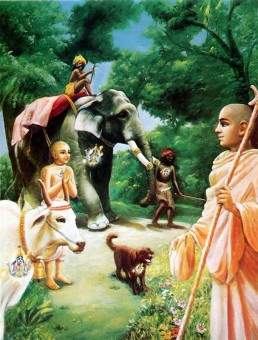Gita Chapter 5 – Verse 24 « »
योऽन्तःसुखोऽन्तरारामस्तथान्तर्ज्योतिरेव यः ।
स योगी ब्रह्मनिर्वाणं ब्रह्मभूतोऽधिगच्छति ॥ ५-२४॥
yo’ntaḥsukho’ntarārāmastathāntarjyotireva yaḥ
sa yogī brahmanirvāṇaṃ brahmabhūto’dhigacchati 5-24
He who is happy within, who rejoices within, who is illuminated within, that YOGI attains Absolute Freedom or MOKSHA, himself becomin g BRAHMAN.
yaḥ = one who; antarsukhaḥ = happy from within; antarārāmaḥ = actively enjoying within; tathā = as well as; antarjyotiḥ = aiming within; eva = certainly; yaḥ = anyone; saḥ = he; yogī = a mystic; brahmanirvāṇaṃ = liberation in the Supreme; brahmabhūtaḥ = being self-realized; adhigacchati = attains.;

